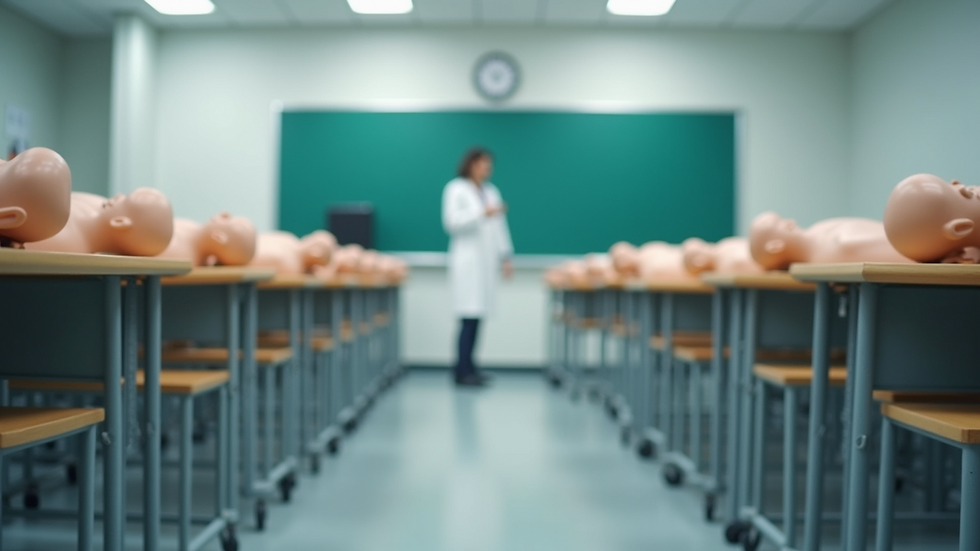Quick thinking police officers saved a man’s life with CPR and AED training they had a week before
- Tom Claudio
- Aug 23, 2022
- 3 min read

Dr. Stephen Sroka made the remark, "I feel exhausted" when speaking to public school employees about Ohio's rising heroin addiction crisis.
Sroka, a well-known motivational speaker, had been discussing challenges he had faced growing up in poverty. The crowd assumed Sroka's "tired" comment was part of the presentation because he occasionally uses a dash of drama to make a point.
Sroka instantly fell to the ground.
It wasn't an act, Brenner swiftly recognized. Sroka's head landed on the platform. Sroka was not breathing and had no pulse, so Brenner and two school police resource officers raced to help him. He was having a heart attack.
CPR was started by officers Mike Wesner and Al Roland. Wesner reached for an AED in the area and gave it to Brenner, who had received updated training on the device two weeks earlier. The AED delivered a shock when he connected it, and just within a minute, Soroka’s heart started.
Sroka claimed, "I went out to save the school, but the school ended up saving me."
The medical information about Sroka was given to officials on the scene by one of his daughters, a school district psychologist, who was not present but was called by a friend.
Sroka was transported by emergency medical personnel to Medina Hospital, from which he was flown to the Cleveland Clinic.
“They were excellent. They kept me in check. They advised me to calm down,” Sroka said. However, he claimed that while in the helicopter, he "had this feeling that if I rested I was going to die."
“I've just realized that one person's power is insufficient," he said. "You need the power of one in life in general. However, you can't succeed with just one person. You require collective strength."
The officers, the assistant principal, the ambulance drivers, the hospital staff, the helicopter pilots, and numerous others saved his life on that day, January 15, 2016.
He said, "I ought to be dead." According to American Heart Association statistics, just 13% of people who experience abrupt cardiac arrest outside of a hospital survive.
Sroka did not use tobacco or alcohol. Atrial fibrillation, an irregular heart rhythm that can be treated with medicine, was the only cardiac condition he was aware of. The day before his fall, he had exercised.
Seven blocked arteries were discovered by hospital examinations. Five stents were inserted, and a defibrillator was later put in Sroka's chest in case a shock to the heart was ever required.
Sroka consumes less meat, sugar, and salt these days.
Sroka works as a volunteer for the American Heart Association to promote prevention. In the past, he helped the foundation with anti-smoking initiatives. Sroka stresses the significance of being familiar with CPR and AED usage.
Sroka declared that "knowledge is power." Sroka was one of the proponents of the Ohio law that mandates CPR and AED training for high school students and was passed into law in June.
The associate principal, Brenner, concurs, pointing out that using an AED is largely self-explanatory and that the equipment instructs the user on what to do.
Sroka is returning to deliver his speech on Friday "with more heart" after he was unable to complete it in Medina in January.
He claimed that what had happened to him had altered both his identity and his purpose. "Helping people is the only purpose I have to live."





Click here provide members with discounts on over-the-counter medications, vitamins, and health essentials, promoting better health management and cost-effective wellness solutions. kaiserotcbenefits.com - more details here
Click here help you find recent death notices, providing information about funeral services, memorials, and tributes for loved ones in your area. obituariesnearme.com - more details here
Click here? Many users have had mixed experiences with the platform, so it's important to read reviews and verify deals before booking. istravelurolegit.com - more details here
AV在线看 AV在线看;
自拍流出 自拍流出;
国产视频 国产视频;
日本无码 日本无码;
动漫肉番 动漫肉番;
吃瓜专区 吃瓜专区;
SM调教 SM调教;
ASMR ASMR;
国产探花 国产探花;
强奸乱伦 强奸乱伦;
AV在线看 AV在线看;
自拍流出 自拍流出;
国产视频 国产视频;
日本无码 日本无码;
动漫肉番 动漫肉番;
吃瓜专区 吃瓜专区;
SM调教 SM调教;
ASMR ASMR;
国产探花 国产探花;
强奸乱伦 强奸乱伦;
代发外链 提权重点击找我;
蜘蛛池 蜘蛛池;
谷歌马甲包/ 谷歌马甲包;
谷歌霸屏 谷歌霸屏;
谷歌霸屏 谷歌霸屏
蜘蛛池 蜘蛛池
谷歌快排 谷歌快排
Google外链 Google外链
谷歌留痕 谷歌留痕
Gái Gọi…
Gái Gọi…
Dịch Vụ…
谷歌霸屏 谷歌霸屏
负面删除 负面删除
币圈推广 币圈推广
Google权重提升 Google权重提升
Google外链 Google外链
google留痕 google留痕
代发外链 提权重点击找我;
游戏推广 游戏推广;
Fortune Tiger Fortune Tiger;
Fortune Tiger Slots Fortune…
谷歌马甲包/ 谷歌马甲包;
谷歌霸屏 谷歌霸屏;
מכונות ETPU מכונות ETPU;
;ماكينات اي تي بي…
آلات إي بي بي…
ETPU maşınları ETPU maşınları;
ETPUマシン ETPUマシン;
ETPU 기계 ETPU 기계;